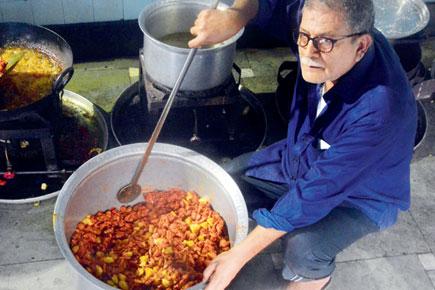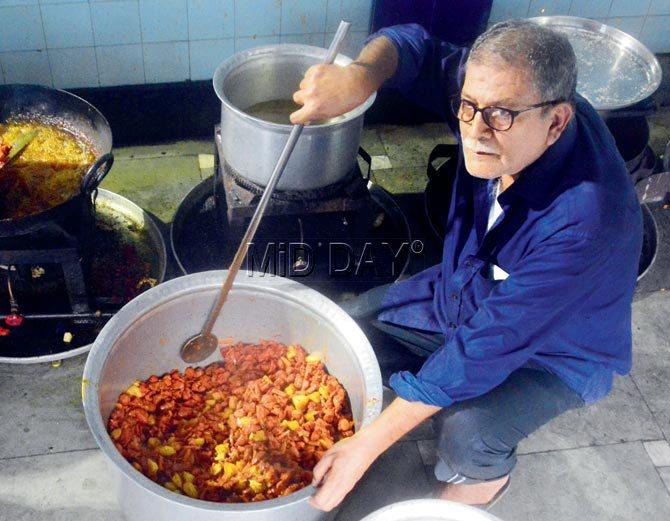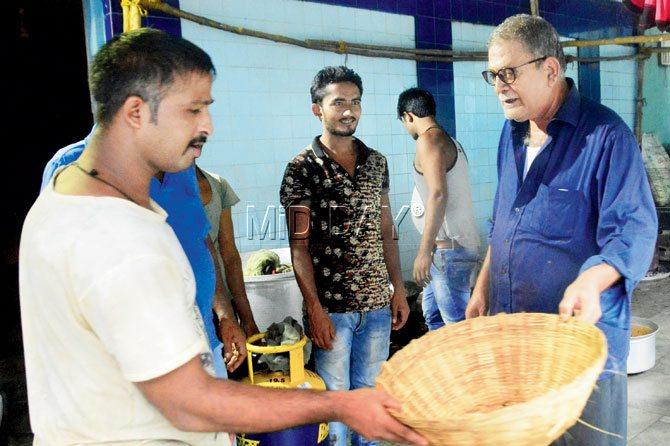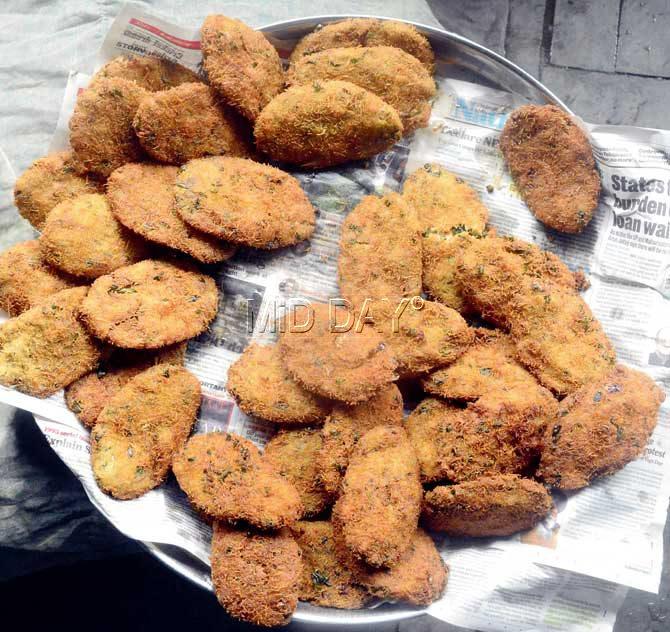Meet Hussain Rezwan, a first generation Iranian Muslim in the city, who cooks memories for his 5,000-strong community in Mumbai


Sixty-seven-year-old Hussain Rezwan, a resident of Sandhurst Road, has been catering for Iranian weddings and community prayer meetings for the last 40 years. His menu is a mix of Indian and Iranian fare. Pics/Bipin Kokate
ADVERTISEMENT
It's a rain-soaked Sunday morning when we meet Hussain Rezwan at the Moghal Masjid, a 160-year-old Iranian mosque tucked in a narrow bylane of Dongri. Clad in a white vest and grey trousers, he looks relatively relaxed. "Had you visited me last week, I wouldn't have had the time to say, hello," he says. Unlike the last 29 days when the 67-year-old would get to work at 8 am and wind up 12 hours later, today he can afford a late start. "It's the last day of Ramzan, and we don't have to prep for sehri. We'll start preparing the iftar meal only by 2.30 pm, so that it doesn't get cold by evening," he tells us, as we take a seat in Husseini Hall, located in the mosque premises.
The 200-seater has red and green carpets laid out for devouts to break their fast at dusk. One corner has large cauldrons kept ready with chopped onions and tomatoes. And, next to this, is the kitchen area where Rezwan has been spending the last one month – preparing iftari for members pro-bono. On other days, the city's only Irani caterer operates from his functional kitchen at Mirza Ali Street, few lanes away. "It's smaller than this, around 700 sq ft, but it's manageable, because it's just two workers and myself." For big orders, he sources assistants. Rezwan is the longest standing caterer to the Iranian Muslim community in the city which has a population of not more than 5,000. Rezwan has been catering for Iranian weddings and community prayer meetings with Indian and Iranian fare for the last 40 years.

Hussain Rezwan has staffers from UP who have been trained in Persian cooking techniques
A mixed cuisine
Sunday's menu for iftar included chicken tikka biryani. The turnout this month has been 700 people per day. "We prepare different types of pulaos every day of Ramzan" he says. While pulao or polow (the Iranian pronunciation) is a fairly universal item in Iranian cuisine, it is a cherished dish prepared in different permutations. "The polow is aromatic, flavoursome and non-spicy," says Rezwan, whose family hails from Yazd, a desert town located 270 km south-east of Esfahan in Iran. The Indian pulao, he explains, is an offshoot of the cultural and culinary exchange between Central Asia and India. "When you settle in another country, you adapt to its ways, and even contribute to its culture. So, today, my cooking is like a bhelpuri of Persian and Indian food," he jokes.
When Rezwan started his catering business in 1981, he focused on Iranian cuisine for small, intimate functions. It was only when business picked up, that he hired Indian chefs. Today, he has cooks from Uttar Pradesh, now adept at Iranian cuisine, and, his catering includes a mix of both Indian and Persian items.
While mutton and chicken biryani is the most sought-after at functions, items like zereshk polow, barberry rice with chicken, chelo kebab (steamed, saffron basmati rice topped with one of the many varieties of Persian kabab) and tas kabab (a fusion of meat and various vegetables, layered and piled on top of each other and slow cooked) are popular in the community.
When it comes to food, Rezwan says there isn't much difference between Zoroastrian and Iranian Muslims. "Iran was a Zoroastrian nation. It was only 2,000 years ago that people converted to Islam. While religious practices may differ, food habits continue to overlap," he says. For instance, Nowruz or New Year, which falls on the first day of spring, on March 21, is celebrated by both Parsis and Muslims. "Iranians set up a table laden with lentil sprouts, a wheat pudding, dried oleaster berries, apples and vinegar, apart from other items like candles, mirrors, coloured eggs and even goldfish bowls."

Chicken kebabs are usually prepared during iftar when people break their fast
Iranian genes speaking
One of 11 siblings (seven sons and four sisters), Rezwan is the only one from the family inclined towards the hospitality sector. "We owned a restaurant at Crawford Market called Sharif, but that place went in for redevelopment, and we don't plan to reopen it," he says. In the 1920s, Rezwan's father was one of many Iranians who fled the country to escape the famine in which several perished. While some made their journey to Mumbai on foot, his father arrived on a ship with fellow villagers.
"Bombay was the obvious choice because of its commercial prospects," says Rezwan, adding that when the Zoroastrian Iranians of Bombay realised his family hailed from Yazd, they offered them assistance. "They would sometimes employ them in the restaurant and give them the reins to manage it. A couple of years later, they would sell the shops to them. That's how Iranian Muslims came to own half of the restaurants in the city," he explains. Back then, since there was no pagdi system, we only had to pay rent. "After that they became owners themselves and stayed on in India," he says.
While there was a time when Iranian Muslims owned almost 80 per cent of Mumbai's restaurant business, today it's less than 10 per cent.
Rezwan says that during Mohammad Reza Shah Pahlavi's time in Iran, several foreign companies started investing in the country. Those who were educated and well versed in English, would be assured of gainful employment. "So, they exhorted the diaspora to return. People sold their property and went back. Today, they are leading good lives with a decent pension from the government," he says. Rezwan, who has family back in Iran, first visited the country at the age of 63.
But it's Mumbai that he loves. "Of course, life is good there as long as you don't meddle in government matters or criticise the establishment. But for me, Mumbai is home."
Like him, his son, Ali, is training to be a chef. "He asks me for tips on cooking. But, I tell him, if you really want to learn, watch me at work. Not once or twice but everyday."
 Subscribe today by clicking the link and stay updated with the latest news!" Click here!
Subscribe today by clicking the link and stay updated with the latest news!" Click here!






